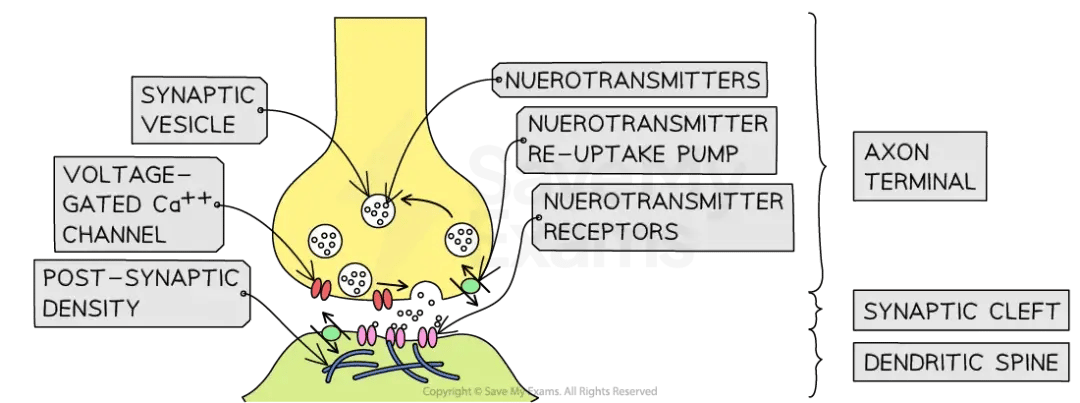Syllabus Edition
First teaching 2025
First exams 2027
Neurotransmission & Major Depressive Disorder (DP IB Psychology): Revision Note
The role of serotonin in MDD
Neurotransmitters are chemical messengers that pass signals between the presynaptic neuron and postsynaptic neuron across the synaptic cleft
Serotonin (5-HT) is a monoamine neurotransmitter that helps regulate functions such as sleep, mood, body temperature
Low or irregular levels of serotonin have been linked to symptoms of MDD
Synaptic transmission
Synaptic transmission involves a series of events
A signal begins as an electrical impulse (an action potential) in the presynaptic neuron
When it reaches the end of the axon on the pre-synaptic knob, neurotransmitters are released from structures called vesicles at the presynaptic membrane
Neurotransmitters are released into the synaptic cleft, diffuse across the synaptic cleft and temporarily bind with receptor sites on the postsynaptic membrane
This stimulates a new electrical impulse (action potential) in the postsynaptic neuron
The neurotransmitter molecules left in the synapse are then either broken down by enzymes or reabsorbed (recycled) to prevent continued stimulation

The neurochemical explanation of MDD
Biological explanations of MDD take the ‘nature’ side of the nature/nurture debate, suggesting behaviour is influenced by innate, inherited traits
The neurochemical explanation of MDD looks at how neurotransmitters affect behaviour
Polymorphism in the 5-HTT gene has been linked to the monoamine hypothesis, which suggests that mood disorders are related to levels of monoamines (e.g., serotonin)
Monoamines are chemicals that transport neurotransmitters like serotonin around the brain
Serotonin is strongly implicated in MDD; low or irregular levels are linked to depressive symptoms
Evidence to support the monoamine hypothesis can be found in the action of selective serotonin reuptake inhibitors (SSRIs), which block the reabsorption of serotonin, leaving more available in the synapse
Since SSRIs are effective treatments for depression, this supports the idea that serotonin plays a role in the onset and experience of MDD
Research support for the neurochemical explanation of MDD
Caspi et al. (2003)
Aim:
To investigate the link between variations of the 5-HTT serotonin transporter gene and MDD
Participants:
An opportunity sample of 847 participants aged 26 years
The participants were split into three groups based on their 5-HTT gene alleles
Group 1 – two short alleles
Group 2 – one short and one long allele
Group 3 – two long alleles
Procedure:
The participants were asked to report stressful life events that had occurred between ages 21-26
The Diagnostic Interview Schedule was used to assess incidences of depression over the past year
The researchers carried out correlational analyses between the following co-variables:
Stressful life events and depression
Allele length and depression
Perceived stress and allele length
Results:
The participants with two short 5-HTT alleles reported greater depressive episodes in response to stressful life events compared to the other two groups
The participants with two long alleles reported fewer depressive symptoms overall
Conclusion:
There may be a relationship between short 5-HTT alleles and vulnerability to stress-induced MDD
Long 5-HTT alleles may provide protection against stress-induced depression, possibly due to steadier serotonin supply
Evaluation of the neurochemical explanation of MDD
Strengths
There is clear research support for the monoamine hypothesis based largely on the role of SSRIs in treating depression
SSRIs are cheap, widely available and effective for many
Limitations
The evidence supporting a neurochemical explanation is not 100% conclusive
Antidepressants such as SSRIs do not work for everyone; research has found that only one third of patients responded positively to SSRI treatment
Link to biological reductionism
Attempting to explain a complex condition such as depression using the neurotransmitter argument is biologically reductionist
This is because depression cannot be easily defined as a simple neurochemical imbalance, as there are other factors involved, plus depression does not follow a ‘one size fits all’ model: it is different for each depressed person
Link to concepts
Perspectives
Depression is unlikely to stem from purely biological factors
MDD may develop due to other reasons:
Cognitive – faulty schemas, negative thinking
Sociocultural – poverty, abuse, problematic relationships
Depression should be viewed holistically rather than as a set of symptoms which only a biological treatment (e.g., drugs) can successfully treat
Causality
The neurochemical explanation supports psychology as a science:
Objective methods, clinical data, replicable findings
However, cause–effect between serotonin and MDD is not fully established

Unlock more, it's free!
Was this revision note helpful?
